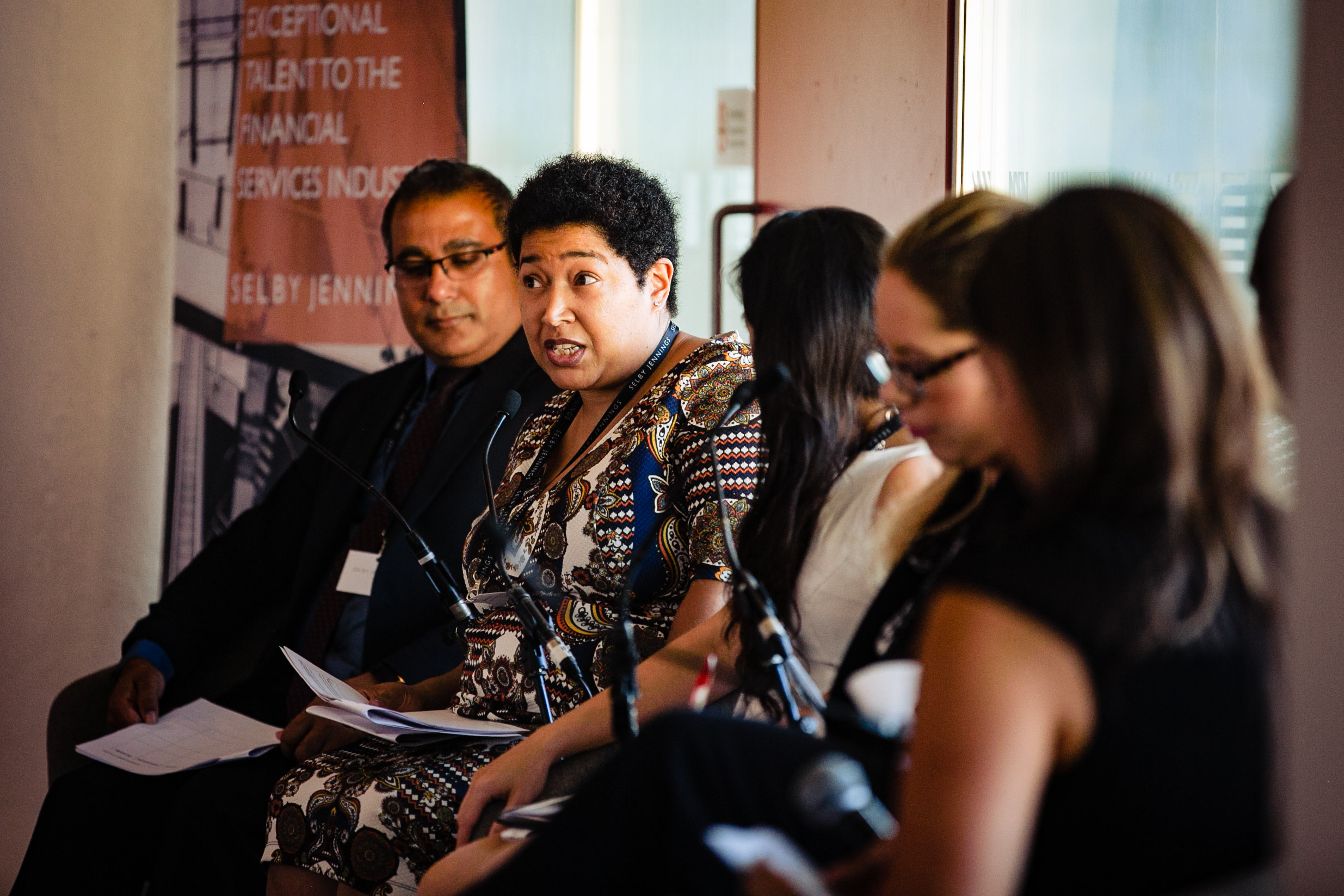Increasingly, the research suggests that organisations have increased financial performance when they have better gender parity. Yet, few leaders are driving the business case for gender diversity. Some are reluctant to associate diversity and inclusion with the bottom line, yet our research concluded that doing so is necessary to secure employee buy-in. Most professionals believe that gender diversity is only presented as a ‘people-related issue’ by their HR department, and not championed by leadership as a business one.
We wanted to face the issue head-on, with the hope that we could refocus gender diversity as a tangible aspect of the workforce that has real benefits, and encourage organisational leadership to present the business case to their employees. In partnership with the Employers Network for Equality and Inclusion (enei), we invited over a hundred industry leaders in Banking and Financial Services to join us at the Southbank Centre to discuss our research findings at our event, Driving Diversity and the Bottom Line.
The evening commenced with Andrew McNeilis, CCO, setting the scene with some challenging questions, including, “Our survey respondents said they wanted to be hired on merit, not their gender or background. Is it possible to foster a diverse and meritocratic workforce, or are they mutually exclusive concepts?”
Kieron O’Reilly, from enei, then presented Selby Jennings’ research findings. He engaged the audience, asking them for a show of hands if they had received any gender diversity training from their organisations. Matching our findings, only a third had. Only a few hands remained raised when asked if the business case had been included in their training. Kieron highlighted how Selby Jennings’ key recommendations can be used by forward-thinking firms to enable a competitive advantage.
Zahra Husain, co-founder of Humans in Finance and a professional with over ten years’ experience in leveraged finance, moderated the main event: a panel discussion with five industry experts. The panel held a diverse range of professionals, coming from Banking and Financial Services, the private and public sectors, as well an ‘outsider’ view from the Defence and Security industry.
Antonia Lim, Head of Quantitative Research at Barclays UK, discussed the frustration of being labelled as a successful ‘woman’ in finance, and also raised the issue of equal parental leave and benefits as a solution to reducing gender inequality. She suggested strategies such as encouraging shared leave; professional one-to-one coaching for high talent junior employees; and greater transparency in senior recruitment, to increase diversity across the workforce and boost the economy.
Dipak Arya, Head of D&I, Air Sector, at BAE Systems, shared how he had originated and implemented diversity and inclusion programmes across a range of multinational, complex matrix organisations. He stressed how vital it is for organisations to lead from the top by ensuring their board members are from a diverse range of backgrounds.
As a Diversity and Inclusion manager at AXA, Jessica Hardy shared her experience of champion diversity in the Insurance sector, and how her company are leading the way to ensure that everyone can bring themselves fully to work. She shared how increased gender diversity gives AXA a competitive edge, as their workforce reflects their customer base.
Juliana Francis, from the Financial Services Ombudsman, share the value of disrupting the traditional approach to hiring that an organisation has become comfortable with. As a woman of colour, she also shared how the aspects of her background that she felt discriminated for had changed over time; at first, her race was the biggest obstacle, yet today she finds herself more biased for her gender. Juliana stressed the importance of championing diversity and inclusion holistically, so that organisations can take advantage of the best talent from the widest talent pool.
Likewise, Lionel Owusu from MUFG Securities emphasised the need to consider disability as one aspect of promoting diversity and inclusion in the workforce. Responding to a question from the audience, he discussed how, globally, disability is more prevalent in women, rendering them more likely to face a ‘double disadvantage’ at work. As an accredited organisational psychologist, Lionel gave constructive advice on how to increase gender diversity in the workforce, and how this benefits financial and cultural performance.
Guided by Zahra’s expert moderation, the panel had a highly engaging discussion that championed the individuals and organisations taking positive action within Banking and Financial Services to promote gender diversity. Please email diversity@selbyjennings.com to keep up to date with our future events as part of our Inclusive Talent series. For a copy of our research paper, which summarises current research that supports the business case for gender diversity, provides key recommendations, and details the workforce’s views, please download here.
--------------
About Us
Selby Jennings is a leading specialist recruitment agency for banking and financial services. For more than 15 years, we have given clients and candidates peace of mind that the recruitment process is in expert hands. Our continual investment in best-in-class technologies and consultant training enables us to recruit with speed, precision and accuracy. Today, Selby Jennings provides contingency and retained search recruitment across 11 offices in 6 countries. Contact us to find out how Selby Jennings can help you.
